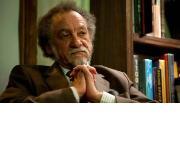
Jakes Gerwel taught me that I did not have to buy in to a narrow definition of coloured people
ON Monday we were told that Professor Jakes Gerwel had died. It was not true. He was indeed gravely ill after recovering from a heart operation.
On Wednesday morning the news was true. He had passed away.
As I sat drinking my morning coffee in Johannesburg, my thoughts travelled back to Cape Town, my home town. Because it is there that I first heard of Gerwel, when I was still in high school.
It was the days of the United Democratic Front and the stayaways, of young people — children really — being arrested, detained and killed for believing in a different South Africa.
In the midst of the tragic, brave chaos stood Gerwel as the vice-chancellor of the University of the Western Cape (UWC), the “bush university ” the National Party had built for coloureds.
Gerwel believed in the rightness of the Freedom Charter as fervently as the students he led in the overthrow of the galling
On injustices of apartheid.
Perhaps I am being presumptuous about my interpretation of this man’s life and ideals. After all, I met him only a few times. There are multitudes who can lay claim to knowing him, who marched alongside him facing teargas, armed riot police and the might of the apartheid regime’s weaponry and intimidation.
There will be far more intimate tributes paid to this man who was born in the Eastern Cape and played such a significant role in the Western Cape.
It’s there in Ampie Coetzee’s memories of him, published on LitNet this week — that Gerwel loved art, that he drank his coffee with plenty of sugar, calling it “coloured people ’ s heroin”.
It’s there in the fondness of Trevor Manuel’s tribute, published in The Times, when he talks of sharing a home with Gerwel during their time working in Nelson Mandela’s cabinet and the nights of debates and discussion.
It’s even there in Gerwel’s own writing — in the column he wrote for Rapport for 12 years. It is there he expressed his disappointment in what the ANC had become and his optimism in the strength of civil society.
But what Gerwel did for me was to show that not all coloured people were the same, that we did not need to hide in a shamed enclave of mixed ancestry.
He, like Manuel, Allen Boesak, Rhoda Khadalie and Cheryl Carolus transcended the narrow confines of their race classification, shedding the notion that we should be closer to our white masters than to our African brothers and sisters.
But their political beliefs, with nonracialism a cornerstone, cast them as moeilikheidmakers and opstokers among conservative coloured folk. In my childhood home, the professor was regarded with disdain for encouraging the politicisation of UWC. My father flatly refused to sign my application form to study there.
I could — and did — apply to the limp-wristed, ivy-covered University of Cape Town (UCT), departing four years later with a degree and an acute sense of alienation and dislike for the place.
I could even have applied to Stellenbosch, the home of Afrikaner superiority which bred apartheid’s leaders and the Broederbond cult — but never to “Bush”.
And yet, watching that university stuck on the Kaapse vlakte, I saw something that was far more authentic than the pretence of cordial race relations that prevailed at UCT in the late 1980s.
I saw a man who may have privately held fears and doubts but showed a face of courage to a hostile world. I saw a man who consistently held on to his principles, who stood for all the right things.
Where I come from, that’s a rare man indeed. Because we were so conditioned by Afrikaners to regard ourselves as superior to African people, many of us — still — refuse to shed that patently false belief of somehow being better.
There were plenty of opportunities for coloured men and women of disputable conviction and morality. The introduction of the tricameral parliament — the National Party ’ s cynical invitation to coloured and Indian chancers to eat from apartheid’s table — revealed the sellouts in their shameless repulsiveness. They were the opposite of Gerwel, convincing ordinary coloureds to buy into a sham of equality.
Gerwel was the antidote to the sellouts, a man who was unbowed at a time when his own people were burdened by the unyielding yoke of their origins — slavery.
And so, today, I want to thank Jakes Gerwel for being a beacon of hope during difficult times, for showing a coloured girl from the Flats that there were better among us.
So, Professor Gerwel, baie dankie vir wat jy vir hierdie enkeling beteken het. Rus in vrede . (Thank you, Professor Gerwel, for what you meant to this one person. Rest in peace.)
By Phylicia Oppelt
Source: Sunday Times
Picture source: Mail and Guardian
